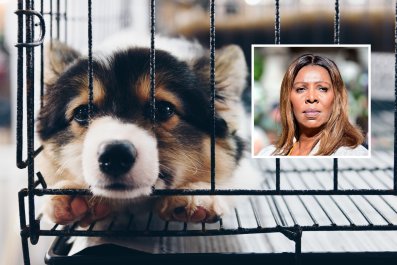
Letitia James Announces Ban on Pet Stores Selling Dogs
New York City pet stores will soon be banned from selling dogs, cats and rabbits under a new law set to take effect on December 15, according to Attorney General Letitia James.
The pet sale ban aims to stop dangerous large-scale breeding operations known as "puppy mills," where animals often face mistreatment and serious health issues.
"Bringing a new pet into a family should be a time of excitement and joy, but animals from 'puppy mills' often suffer from serious medical issues, leaving families heartbroken and with hefty veterinary bills," Attorney General James said in press release. "This pet sale ban will help end the dangerous puppy mill-to-pet store pipeline that endangers pets and costs New Yorkers thousands of dollars in veterinary care."
Senate Deputy Leader Michael Gianaris and Assemblymember Linda B. Rosenthal co-sponsored the Puppy Mill Pipeline Act, which bans the sale, lease or transfer of pets through retail stores. The law permits pet stores to charge rescue groups reasonable fees for using their space to showcase pets available for adoption.

"This is a great step forward for our four-legged friends as we continue to fight against abusive and inhumane puppy mills," Gianaris said in a press release. "We have stood up for the voiceless animals, who deserve respect and compassion and I am grateful the Attorney General intends to vigorously enforce our new law."
"This law will spare countless animals the abuse and disease they suffer in puppy mills and will protect consumers as well. However, as with any piece of legislation that upends the status quo, we can anticipate some establishments may employ every imaginable legal trick to evade the law," Rosenthal said in a press release.
New Yorkers can still adopt pets, pet stores can partner with rescue organizations, or you can go to a certified breeder.
— NY AG James (@NewYorkStateAG) November 22, 2024
This new law will help end the dangerous puppy mill-to-pet store pipeline that endangers pets and leaves families with expensive vet bills and broken hearts.
Retail pet stores selling pets after December 15 risk penalties of up to $1,000 per violation. New Yorkers searching for a furry companion can still adopt pets from humane societies, animal rescues or licensed breeders.
Earlier this year, Attorney General James secured $300,000 from Shake A Paw, a Long Island pet store, to compensate hundreds of consumers who were illegally sold sick puppies without their knowledge. The illnesses reflected conditions commonly found in dogs bred and purchased from puppy mills.
According to their website, they are the "retailer of healthy puppies," yet they failed to disclose the animals' genuine medical conditions, misrepresented the puppies' breeds, and refused to reimburse consumers for veterinary bills resulting from the sick dogs they sold.
Newsweek reached out to Shake A Paw for comment.
What Is A Puppy Mill?

A puppy mill is a commercial dog-breeding facility prioritizing profit over the welfare of the animals. These facilities often breed dogs in overcrowded and unsanitary conditions, providing minimal veterinary care, poor nutrition and inadequate socialization for the animals. Female dogs are frequently bred repeatedly without sufficient recovery time between litters, which can harm their health.
The puppies produced in puppy mills are typically sold to pet stores, brokers or directly to consumers through online ads or classified listings. Many puppies from these operations suffer from genetic disorders, illnesses or behavioral issues due to poor breeding practices and neglect.
Do you have a story Newsweek should be covering? Do you have any questions about this story or the Menendez Brothers? Contact LiveNews@newsweek.com
